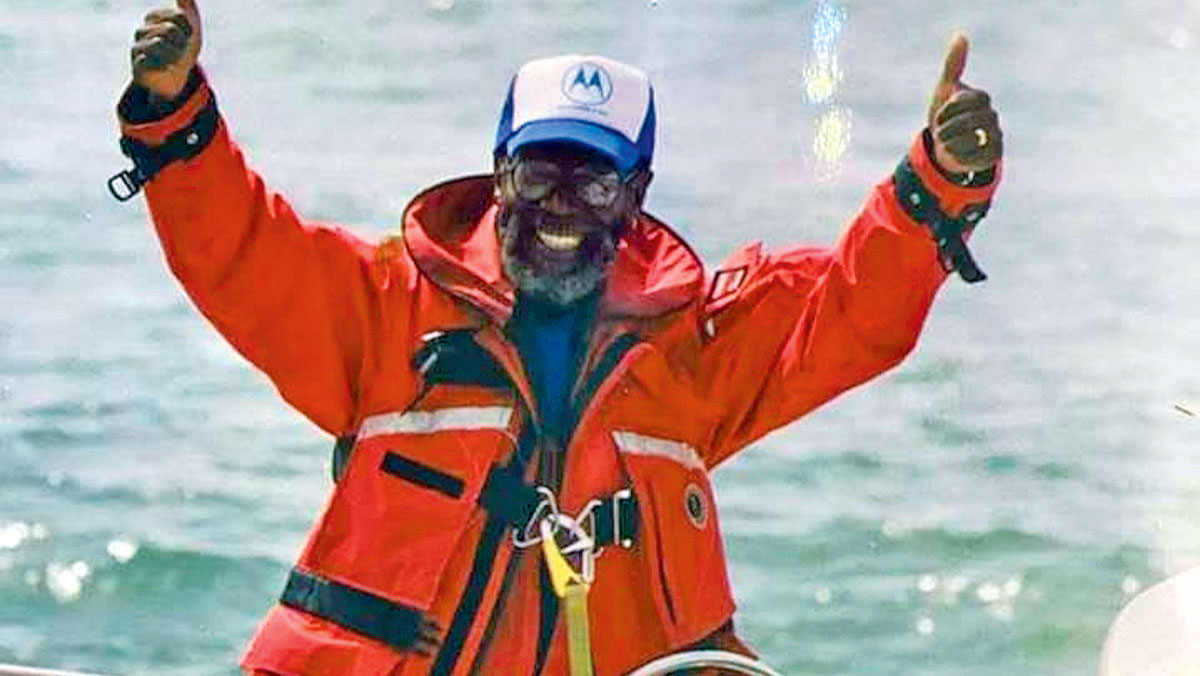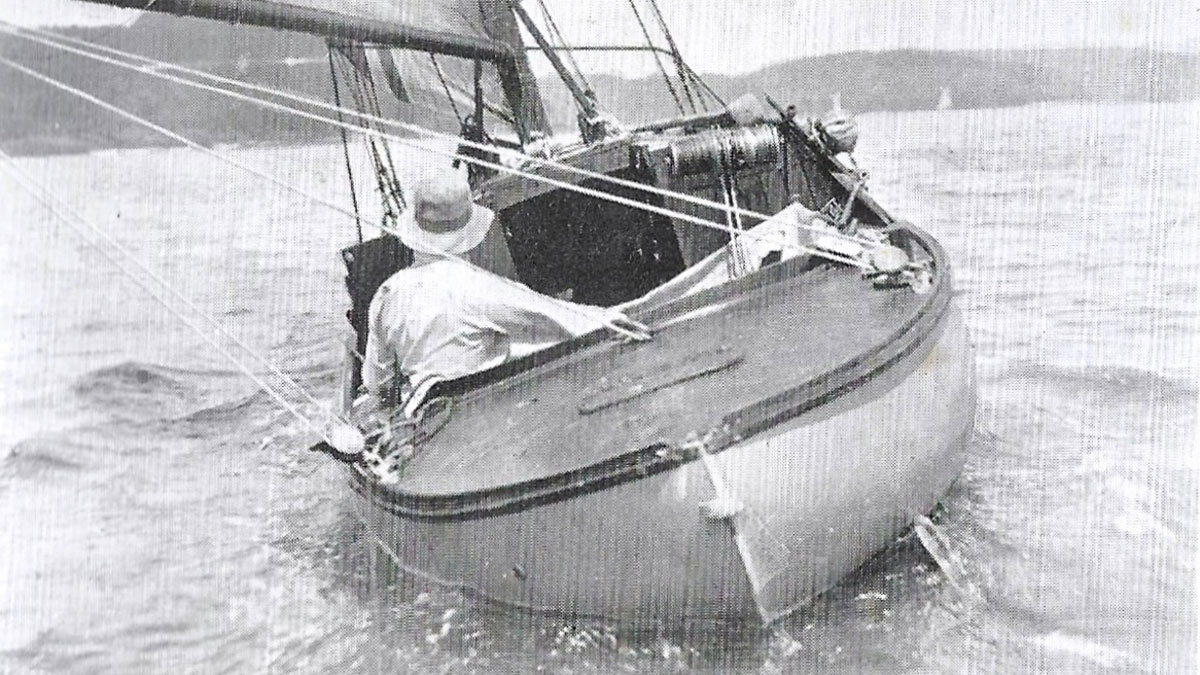Blue Water Medal winner Captain Eric Forsyth, who circumnavigated the world twice, and rounded Cape Horn four times in his yacht, Fiona, has died
Eric Forsyth, who spent 50 years cruising the world’s oceans, most of them aboard his Westsail 42, Fiona, has died, aged 91, after a short illness.
The skipper, who was born in England before emigrating to Canada in 1957 and then to the USA in 1960, was a recipient of the Seven Seas Award, and a Blue Water Medal Winner for his 2000 cruise to the Antarctic circle on the Peninsular at 67°S.
He also completed two circumnavigations of the world aboard Fiona – one westabout via the Panama Canal and one eastabout via Cape of Good Hope and Cape Horn.

Eric Forsyth happy aboard his 42-foot cutter, Fiona. Credit: The Forsyth Family
Born in Bolton in 1932, Eric Forsyth went to Bolton School before attending Manchester University on a small scholarship in the 1950s, where he joined the University Air Squadron; after graduation, he became a fighter pilot flying Meteor Mark 8 Fighters.
In 1957, he emigrated to Canada. His then-girlfriend, Edith, followed him and the couple married in Toronto.
Eric completed his BS degree in Electrical Engineering at the University of Toronto, before he and Edith were recruited to work at the Brookhaven National Laboratory in Long Island, New York State.
Living and working on Long Island meant easy access to the sea and boats, and Eric began sailing, learning on a 16ft plywood yacht.
This was soon exchanged for True Rocket, a 23-foot yacht with a small cabin and inboard engine.
His love for offshore cruising came in 1964 after he and Edith crewed on a friend’s 46-foot home-built cutter – it was their first Atlantic crossing.

As a young RAF officer. He flew Meteor Mark 8 Fighters. Credit: The Forsyth Family
In 1968, he took a leave of absence and sailed with Edith and his then three-year-0ld son, Colin to the Caribbean in their 35ft Dutch-built sloop, Iona.
The family spent a year cruising the islands before returning to New York State, where Eric began the eight-year build of his Westsail 42, Fiona from a bare glassfibre hull. The yacht was launched in 1983.
During the 1970s and 1980s Eric continued to sail and race, taking part in six Newport Bermuda races, where he was navigator under Captain Hilgendorff.
It was while plotting navigational courses using celestial navigation, that Eric Forsyth designed a chronometer especially adapted for celestial navigation use; he was awarded a patent for the timepiece.
Continues below…
Circumnavigator Bill Pinkney dies aged 87
Bill Pinkney, who was the first black sailor to sail around the world solo via the five great southern capes,…
Margaret and Frank Dye: open boat pioneers
Roger Barnes reflects on the legacy of small-boat sailors Margaret and Frank Dye
Frank Cowper: the sailor who “invented” cruising
Katy Stickland talks to Frank Cowper’s great granddaughter about the life and legacy of this unsung pioneer of yachting for…
Eric had a long and distinguished career at the Brookhaven National Laboratory including managing the Superconducting Power Transmission Project, serving as Chairman of the Magnet Development Committee for The ISABELLE Project, and finally as the Chairman of RHIC (The Relativistic Heavy Ion Collider).
He led the team that designed the superconducting magnets used in RHIC, and his magnet designs were also the basis for the magnets later used in the Large Hadron Collider at the European Organization for Nuclear Research, known as CERN.
For this work, Eric was presented with the Herman Halperin Award, the highest annual recognition by the Institute of Electrical and Electronic Engineers for power transmission research.
He was also a Fellow of the Institution of Electrical and Electronic Engineers (IEEE), a registered professional engineer in Canada, and a chartered engineer in the E.U. He was an acknowledged world authority on the application of superconductivity.

Eric Forsyth sailed solo and with crew. Credit: The Forsyth Family
After retiring in 1995, Eric sailed Fiona almost full-time, offering around 200 sailors the chance to sail with him over the years, allowing them to gain offshore experience.
His other voyages included a circumnavigation of North America via the Northwest Passage, an Arctic cruise to Spitzbergen at 79°N, 27 Atlantic crossings, four roundings of Cape Horn – three eastabout and one westabout, four visits to the Falkland Islands, including a cruise through much of the archipelago, four cruises to South Georgia and solo passage from the Canary Islands to Salvador, Brazil, and crossing the Barents Sea from Nome to Dutch Harbor.
In 2016, Eric Forsyth published his memoir, An Inexplicable Attraction: My Fifty Years of Ocean Sailing, which charts Fiona‘s build, as well as his cruises.

Eric Forsyth shared details of his voyages and the build of Fiona in his memoir
He also wrote three historical novels about the life of an adventurous RAF pilot during 1930s and ‘40s – Wings Over Iraq (2022), Wings Over the Channel (2022), and his latest, Wings Over Germany (May, 2023).
Eric also shared his sailing adventures via his website www.yachtfiona.com.
He is survived by his son Colin, his daughter Brenda and her husband Robb, and granddaughters Fawn and Gabriella. He was preceded in death by his wife Edith in 1991.
Those who wish to honour Captain Eric Forsyth’s memory are invited to donate to the Post-Morrow Foundation www.postmorrow.org, whose mission is to preserve and conserve the rural, cultural, and historical character of the hamlet of Brookhaven, New York, or toast his honour with a Fiona cocktail – Eric’s recipe: 1 part Mount Gay rum, 2 parts apple juice (chilled- no ice), and a squeeze of lemon.







